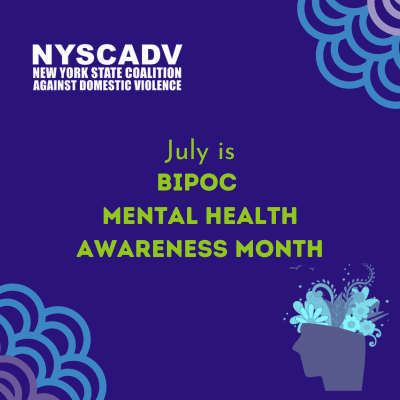
July marks BIPOC (Black, Indigenous, and People of Color) Mental Health Awareness Month, a crucial time to recognize the unique mental health challenges and experiences faced by BIPOC individuals. This month, we shine a light on the intersection of domestic violence and BIPOC mental health, highlighting the need for awareness, support, and action.
Domestic violence is a pervasive issue that affects people of all races and ethnicities. However, BIPOC individuals are disproportionately impacted, experiencing higher rates of domestic violence while often receiving insufficient support and resources for recovery. This disparity can severely affect mental health, leading to conditions such as anxiety, depression, PTSD, and more.
The root of this issue lies in systemic racism and discrimination, which create significant barriers for BIPOC individuals to access necessary resources and support. These barriers can lead to feelings of isolation, shame, and helplessness. Cultural factors also play a role; in some communities, seeking help may be perceived as a sign of weakness or disloyalty to family, further preventing individuals from seeking support.
For mental health professionals, it is vital to understand these unique challenges and provide care that is both culturally responsive and trauma-informed. This involves recognizing the impact of systemic racism, offering culturally relevant resources, and creating a safe, supportive environment that promotes healing and recovery.
As we observe BIPOC Mental Health Awareness Month, let us remember the critical intersections of domestic violence and BIPOC mental health. Together, we can work towards a world where everyone can access the support and care they need to thrive regardless of race or ethnicity.
Here are some resources for support in New York State and the US related to the intersection of domestic violence and BIPOC mental health:
- #BIPOCMentalHealth campaign, Mental Health America: Help raise awareness using their social media toolkit
- NYSCADV Self-Care Toolkit: Recognizing the importance self-care plays in an individual's mental health, NYSCADV has compiled a list of resources for advocates and organizations on topics including self-care, well-being, and resilience. Included are webinars, toolkits, and additional resources to help advocates take care of themselves and support the work that they are doing.
- The National Resource Center on Domestic Violence: This organization provides resources and technical assistance to organizations and individuals working to end domestic violence. They also have a page specifically addressing the unique needs of BIPOC survivors of domestic violence.
- In Our Own Voices: A New York State-based nonprofit whose mission is to ensure the physical, mental, spiritual, political, cultural and economic survival and growth of the Lesbian, Gay, Bisexual and Transgender people of color communities.
- Restore NY/Black Women's Blueprint: Founded by survivors for survivors committed to healing and transformation. Their mission is to provide services and spaces for healing, reconciliation, and human connection with the natural world. Working with the land, they bring people together to design and practice strategies for healing, health, and reparative economics.
- NYC Well: This is a 24/7 confidential helpline for all mental health and substance misuse services in New York City. They offer phone, text, and chat support.
- NYSCADV Primary Prevention Toolkit: In the primary prevention toolkit, you will find various tools, resources, and strategies to promote prevention at local, regional, and statewide levels. The content encompasses traditional prevention resources like school-based curricula, public health approaches, community organizing techniques, and emerging evidence of prevention approaches. Additionally, the toolkit includes a section dedicated to health and mental health and a section focused on dismantling oppression.




